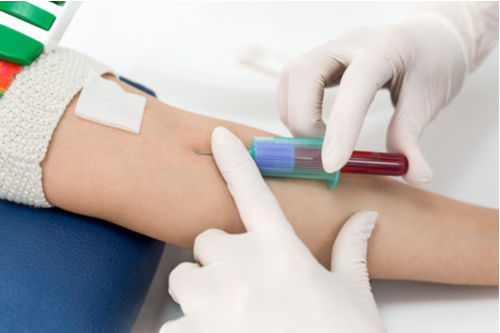General Health
Can A Simple CBC Test Determine Common Blood-Related Diseases?
5 min read
By Apollo 24|7, Published on - 20 May 2022, Updated on - 06 April 2023
Share this article
0
51 likes

Do you know some of the most common ailments can be traced by your blood? Yes. Your blood is often used to detect various illnesses that can affect your overall health. This is accomplished with the help of a specialized test known as a complete blood count (CBC) test. The article explains the test in detail below.
What is the Complete Blood Count (CBC) Test?
A complete blood count (CBC) is a diagnostic tool that helps in the diagnosis of a wide range of blood-related disorders and conditions by measuring the count and features of different types of blood cells, such as:
- Red Blood Cells (RBCs): These are the cells that impart a red colour to the blood. RBCs are responsible for transporting oxygen from the lungs to the other parts of the body.
- White blood cells (WBCs): These cells are part of the immune system. WBCs fight against infection-causing germs in the blood. A test called CBC with differential evaluates the count of each of the five major types of WBCs.
- Platelets: Also known as thrombocytes, these cells play a key role in blood clotting.
- Haemoglobin (HgB): It is an oxygen-carrying protein found in RBCs.
- Hematocrit: This indicates the concentration of red blood cells in the blood.
Why You May Need a CBC Test?
A complete blood count (CBC) test is usually conducted as part of the routine health checkup to evaluate your overall health. However, you may also be asked to undergo it for other reasons, such as:
- To detect an underlying health condition: Your physician may prescribe a CBC test if you are experiencing symptoms such as weakness, dizziness, nausea, fever, bruising, bleeding, pain in joints, and abnormal pulse rate or blood pressure. A CBC test will help detect whether these symptoms are a result of a medical condition such as an infection, anaemia, immune system disorders, and even cancers (leukaemia and lymphoma).

- To observe a pre-existing condition: The test may be conducted if you have been diagnosed with a disorder that impacts the count of your blood cells. A physician may use the test results to monitor your condition.
- To keep tabs on medical treatment: The test is often used to evaluate your health if you have been prescribed medications that can potentially affect the count of blood cells.
CBC Test Procedure
During a CBC test, a sample of blood is taken by inserting a small needle into a vein in your arm. The blood sample is usually collected by a healthcare professional. Once the sample has been collected, you can leave and resume your routine activities. The blood sample is sent to the lab for detailed analysis.

CBC Test Preparation
Generally, no special preparation is required before undergoing a CBC test. However, if your physician has recommended additional tests on your blood sample, then you may have to fast for a few hours before the test. Your physician will inform you if there are any specific instructions to observe before the test.
CBC Test Results
CBC test results are usually available within 24 to 48 hours. Your test report will likely have two columns: reference range and your results. If your results lie within the reference range, your report is believed to be normal. Nevertheless, if your results are significantly higher or lower than the reference range, then your physician may prescribe additional tests for a definitive diagnosis. Generally, the reference ranges for the CBC test are:
- Red blood cells:
- Male: 4.35 million to 5.65 million cells/microliter(mcL)
- Female: 3.92 million to 5.1 million cells/mcL
- White blood cells: 3,400-11,000 cells/mcL
- Platelets: 150,000 - 450,000 platelets/mcL
- Haemoglobin:
- Male: 13.2 to 17.5 grams per deciliter (gm/dL)
- Female: 11.5 to 15.3 gm/dL for women
- Hematocrit:
- Male: 38.3% to 55%
- Female: 35.5% to 48%
It is important to note that these reference ranges can vary depending on certain factors including age, gender, and even your geographical location (how high you live above sea level).
Decoding CBC Test Results
If your CBC test yields results that are significantly above or below the reference range, then it may be indicative of an underlying medical problem. For instance:
- Unusual levels of RBCs, haemoglobin, or hematocrit may indicate anaemia or heart disease.
- While low levels of WBCs can be a symptom of autoimmune disorder, bone marrow disorder, or cancer, higher than usual levels may be a sign of inflammation, infection, immune system disorder, bone marrow disease, or adverse medication side effects.
- A platelet count that is lower or higher than normal may be a sign of inflammation, viral infection, or a reaction to some medication.
Is CBC a Conclusive Test?
No, the CBC test is not a conclusive diagnostic tool. If your results are abnormal, it doesn’t necessarily mean that you have a medical condition. Factors such as diet, levels of physical activity, menstruation, hydration, etc. can influence your test results. In such cases, your physician may prescribe other additional tests to ascertain the diagnosis.
A CBC test is a simple blood test that evaluates the count and features of various types of blood cells. It is often carried out as part of the routine checkup to detect diseases, monitor preexisting conditions, and assess the impact of medications and treatment on blood cells. The levels of different types of blood cells are compared with the reference ranges to detect any significant deviation. If the test results are abnormally higher or lower than the normal ranges, then additional tests may be prescribed to ascertain the cause.
Medically reviewed by Dr Sonia Bhatt.
General Health
Leave Comment
Recommended for you

General Health
Eye Donation: 6 Myths To Stay Away From If You Wish To Be A Donor
Though the majority of eye diseases can be treated, blindness is still a huge global health concern. One can help these people by donating eyes. Read on to know the most common myths associated with eye donation.
_1.jpg?tr=q-80)
General Health
MPV Blood Test – Normal Range, Purpose, Procedure, and Results Interpretation
Learn about the MPV Blood Test, its normal range, purpose, procedure, and how results are interpreted. Understand its role in diagnosing platelet-related disorders and monitoring health conditions.

General Health
Irregular Periods? These Hormone Tests Can Help: A Complete Guide for Women Aged 18–35
Experiencing irregular periods between 18-35? Discover which hormone tests can pinpoint the cause. Our complete guide helps you understand results & find solutions for menstrual irregularities.
Subscribe
Sign up for our free Health Library Daily Newsletter
Get doctor-approved health tips, news, and more.
Visual Stories

Plant-based Foods That Are a Great Source of Iron
Tap to continue exploring
Recommended for you

General Health
Eye Donation: 6 Myths To Stay Away From If You Wish To Be A Donor
Though the majority of eye diseases can be treated, blindness is still a huge global health concern. One can help these people by donating eyes. Read on to know the most common myths associated with eye donation.
_1.jpg?tr=q-80)
General Health
MPV Blood Test – Normal Range, Purpose, Procedure, and Results Interpretation
Learn about the MPV Blood Test, its normal range, purpose, procedure, and how results are interpreted. Understand its role in diagnosing platelet-related disorders and monitoring health conditions.

General Health
Irregular Periods? These Hormone Tests Can Help: A Complete Guide for Women Aged 18–35
Experiencing irregular periods between 18-35? Discover which hormone tests can pinpoint the cause. Our complete guide helps you understand results & find solutions for menstrual irregularities.